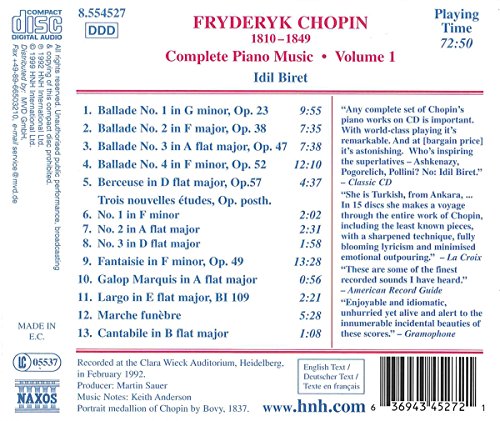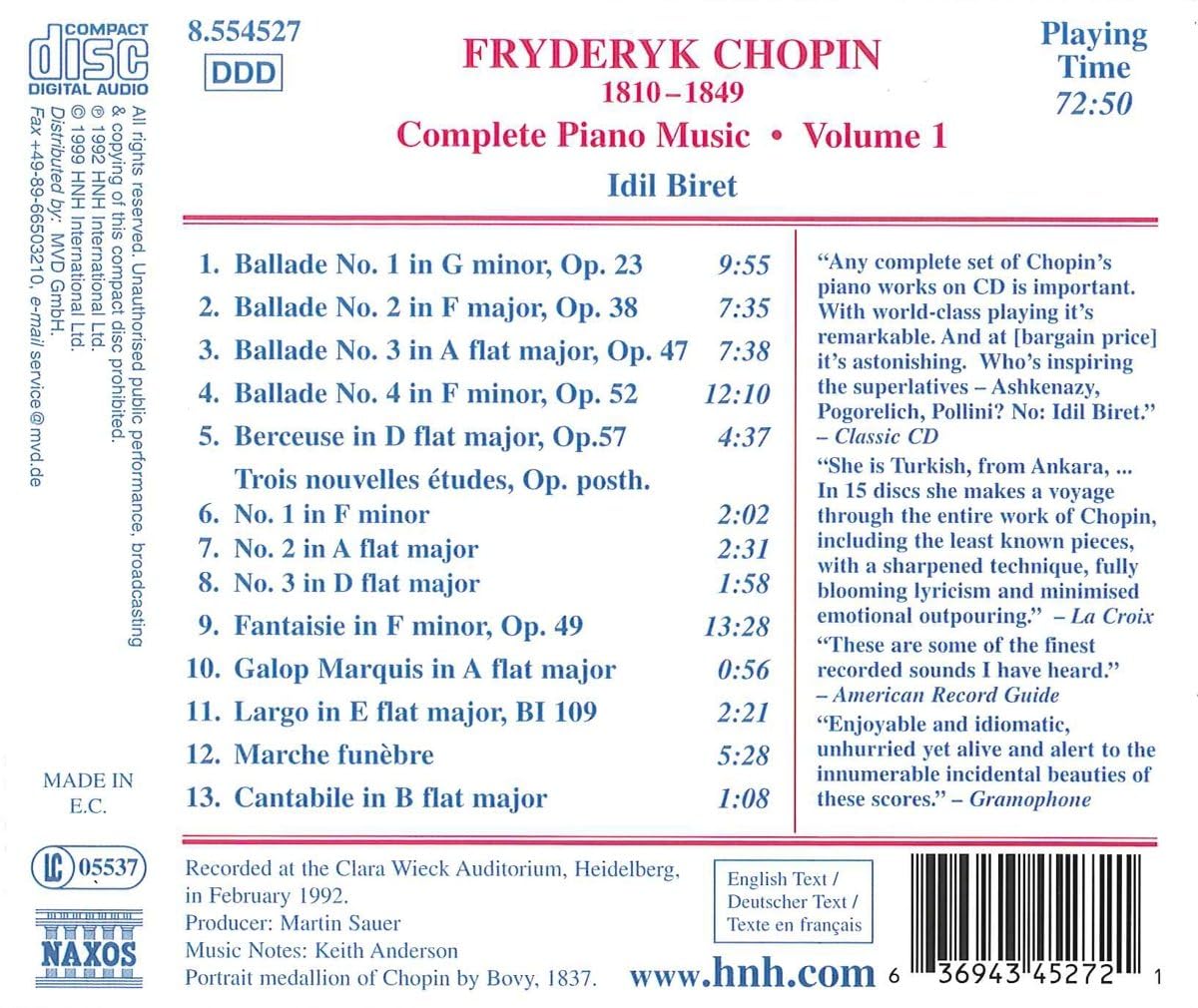Customer Services
Copyright © 2025 Desertcart Holdings Limited








Chopin's four Ballades are among the greatest of his works, as is the Fantasia in F minor also included on this disk. The Ballades were composed between 1835 and 1843 and are generally believed to be based upon works by the Polish poet Adam Mickiewicz. This is music in the style of the medieval troubador, with singing lyrical sections alternating with music of wild passions, big chords, chromatic passages, and virtuosic runs. The first and fourth ballades, in G minor and F minor, tend to be more stormy and passionate while the second and third, in F major and A flat major are more reflective and lyrical. Biret gives a beautiful rendition of this music with beautiful, free rhythm, attention to dynamics and phrasing, and a full use of the resources of the piano. She captures magnificently the wild, virtuosic concluding passages in the first and fourth ballades. Review: The Ballades are not the attraction here - Idil Biret's first recording in this Naxos series looks pretty promising: the four Ballades, the Berceuse, the Fantasy Op. 49 and even the BI 130 etudes. This choice of selections is even more unusual with the addition of the Marche funebre in C minor, and three other rare pieces from Chopin: Galop Marquis, Largo in E flat major, and the Cantabile in B flat major. Having heard so many pianists play the Ballades, I'm afraid Biret is not in the top tier of interpreters here. Her rendition of the first Ballade is occasionally dramatic, but she fails to deliver the songful aspect that I've heard so many pianists accomplish. Even in the passionate and loud sections she displays technique but no melding of the passagework; she makes a choppy onslaught instead of a fiery stream. Fortunately, she makes up for it with the second Ballade in F major. Biret creates equal force in both the sudden outbursts and the fragile soft moments. However, in the third Ballade, Biret is rather average. The virtuosic sections sound dry in her hands; all the rubato in the world won't save this piece without a perfect legato touch. At least Biret is really "on" in the fourth Ballade. She manages to bring out the expressive qualities and lyricism of this fine music while also emphasizing the raw drama. Astonishingly, Biret makes a better case for her pianism and musicality in the rest of the pieces here. The Berceuse is an angelic lullaby through Biret's delicious and tasteful representation. The first BI 130 etude receives stellar phrasing and is played with perfect poetic feeling. The gorgeous second etude is similarly effective because Biret has such a handle on Chopin's improvisatory sound. So I'm really scratching my head at her earlier lackluster spectacle in the first and third Ballade. Biret's major triumph, though, is the monumental Fantasy in F minor Op. 49. Combined with the poise and exquisite rubato this work requires, Biret's meditative mood and muscular attack makes this rendering outstanding. Her dynamic control is breathtaking: her lilting melancholy (3:15-3:25) and explosive passion (3:47-3:57) is incredible. Where is this warm legato, spirit and vitality in her Ballades? It's so odd that she made a milestone with the Fantasy but couldn't quite make it in the Ballades. The last works to mention are the rarities. The Galop Marquis, a short piece barely under a minute, contains a charming little theme, but doesn't really go anywhere. It's like someone plucked a single theme out of a longer work and played it once; it doesn't even feel like there's an agreeable cadence at the end. On the other hand, the Largo in E flat major is a wondrous little piece, presenting some fine bars of exalted melancholy. I wish I could say the same of the Cantabile in B flat major, but there is not enough substance here. The flawless diamond in this sea of flawed gems is the magisterial and dark Marche funebre in C minor. One wonders how this phenomenally potent funeral march could be so neglected. In fact, this is the first time I've heard it. I must tell the curious Chopin cohorts out there that this is made of high quality stuff: a gloomy and powerful funeral march forms the outer shells of a profound and sorrowful trio section. It's a first-rate Chopin work and deserves greater fame. Bottom line: I've heard much better realizations of the Ballades. Although I advise those who are interested in hearing superb interpretations of the Ballades to continue their search, I feel this CD shouldn't even be bought for the Ballades. Biret is at her best in the BI 130 etudes, the Fantasie Op. 49 and the Marche funebre. Considering that these pieces are rather obscure, I think this CD is invaluable for offering them at such a low price. Review: (+) An Alice in Wonderland Perspective - INTRODUCTION: Idil Biret's quirky and willful pianism seldom brings out the natural beauty and subtleties in Chopin's luxurious textures. Apart from being the most perfect condensate of musical and pianistic refinement in the entire piano oeuvre, each of Chopin's four Ballades tells a vast and rich story, thus calling for pronouncedly narrative qualities in the performer. REFERENCES: Demidenko ( Chopin: Ballades; Third Sonata ); Ohlsson ( Garrick Ohlsson - The Complete Chopin Piano Works Vol. 3 - Ballades ) I guess the narrative aspect is what saves Biret's Ballades from the ploddiness of most of her Chopin outings. Even if I wouldn't go as far as to call it successful, I would in fact give it a cautious recommendation as a possible alternative view on these timeless masterpieces--that is, in a manner similar to Pollini's 'short vacation to the very north', Biret's 'Alice in Wonderland perspective' offers some refreshing (relatively speaking only though) variation and distance to the above-listed references and thereby further enhance their depth and magnificence. As to the fillers, Biret's Fantaisie is somewhat worthwhile, whereas her Berceuse is not--one of these typical Chopin creations where her pianism simply doesn't fit. The miscellaneous pieces are...--well, indeed fillers. The problems with the synthetic recorded sound are well-known and as evident as always in this series. TIMINGS: Ballades--9:55, 7: 35, 7:38, 12:10; Berceuse--4:37; Fantaisie--13:28 etc
| ASIN | B00001YVCJ |
| Best Sellers Rank | #428,514 in CDs & Vinyl ( See Top 100 in CDs & Vinyl ) #240 in Classical Etudes #354 in Classical Ballads #412 in Exercise Music |
| Customer Reviews | 3.8 3.8 out of 5 stars (4) |
| Date First Available | February 1, 2007 |
| Label | Naxos |
| Manufacturer | Naxos |
| Number of discs | 1 |
| Original Release Date | 1999 |
| Product Dimensions | 6.18 x 5 x 0.39 inches; 3.46 ounces |
H**N
The Ballades are not the attraction here
Idil Biret's first recording in this Naxos series looks pretty promising: the four Ballades, the Berceuse, the Fantasy Op. 49 and even the BI 130 etudes. This choice of selections is even more unusual with the addition of the Marche funebre in C minor, and three other rare pieces from Chopin: Galop Marquis, Largo in E flat major, and the Cantabile in B flat major. Having heard so many pianists play the Ballades, I'm afraid Biret is not in the top tier of interpreters here. Her rendition of the first Ballade is occasionally dramatic, but she fails to deliver the songful aspect that I've heard so many pianists accomplish. Even in the passionate and loud sections she displays technique but no melding of the passagework; she makes a choppy onslaught instead of a fiery stream. Fortunately, she makes up for it with the second Ballade in F major. Biret creates equal force in both the sudden outbursts and the fragile soft moments. However, in the third Ballade, Biret is rather average. The virtuosic sections sound dry in her hands; all the rubato in the world won't save this piece without a perfect legato touch. At least Biret is really "on" in the fourth Ballade. She manages to bring out the expressive qualities and lyricism of this fine music while also emphasizing the raw drama. Astonishingly, Biret makes a better case for her pianism and musicality in the rest of the pieces here. The Berceuse is an angelic lullaby through Biret's delicious and tasteful representation. The first BI 130 etude receives stellar phrasing and is played with perfect poetic feeling. The gorgeous second etude is similarly effective because Biret has such a handle on Chopin's improvisatory sound. So I'm really scratching my head at her earlier lackluster spectacle in the first and third Ballade. Biret's major triumph, though, is the monumental Fantasy in F minor Op. 49. Combined with the poise and exquisite rubato this work requires, Biret's meditative mood and muscular attack makes this rendering outstanding. Her dynamic control is breathtaking: her lilting melancholy (3:15-3:25) and explosive passion (3:47-3:57) is incredible. Where is this warm legato, spirit and vitality in her Ballades? It's so odd that she made a milestone with the Fantasy but couldn't quite make it in the Ballades. The last works to mention are the rarities. The Galop Marquis, a short piece barely under a minute, contains a charming little theme, but doesn't really go anywhere. It's like someone plucked a single theme out of a longer work and played it once; it doesn't even feel like there's an agreeable cadence at the end. On the other hand, the Largo in E flat major is a wondrous little piece, presenting some fine bars of exalted melancholy. I wish I could say the same of the Cantabile in B flat major, but there is not enough substance here. The flawless diamond in this sea of flawed gems is the magisterial and dark Marche funebre in C minor. One wonders how this phenomenally potent funeral march could be so neglected. In fact, this is the first time I've heard it. I must tell the curious Chopin cohorts out there that this is made of high quality stuff: a gloomy and powerful funeral march forms the outer shells of a profound and sorrowful trio section. It's a first-rate Chopin work and deserves greater fame. Bottom line: I've heard much better realizations of the Ballades. Although I advise those who are interested in hearing superb interpretations of the Ballades to continue their search, I feel this CD shouldn't even be bought for the Ballades. Biret is at her best in the BI 130 etudes, the Fantasie Op. 49 and the Marche funebre. Considering that these pieces are rather obscure, I think this CD is invaluable for offering them at such a low price.
C**.
(+) An Alice in Wonderland Perspective
INTRODUCTION: Idil Biret's quirky and willful pianism seldom brings out the natural beauty and subtleties in Chopin's luxurious textures. Apart from being the most perfect condensate of musical and pianistic refinement in the entire piano oeuvre, each of Chopin's four Ballades tells a vast and rich story, thus calling for pronouncedly narrative qualities in the performer. REFERENCES: Demidenko ( Chopin: Ballades; Third Sonata ); Ohlsson ( Garrick Ohlsson - The Complete Chopin Piano Works Vol. 3 - Ballades ) I guess the narrative aspect is what saves Biret's Ballades from the ploddiness of most of her Chopin outings. Even if I wouldn't go as far as to call it successful, I would in fact give it a cautious recommendation as a possible alternative view on these timeless masterpieces--that is, in a manner similar to Pollini's 'short vacation to the very north', Biret's 'Alice in Wonderland perspective' offers some refreshing (relatively speaking only though) variation and distance to the above-listed references and thereby further enhance their depth and magnificence. As to the fillers, Biret's Fantaisie is somewhat worthwhile, whereas her Berceuse is not--one of these typical Chopin creations where her pianism simply doesn't fit. The miscellaneous pieces are...--well, indeed fillers. The problems with the synthetic recorded sound are well-known and as evident as always in this series. TIMINGS: Ballades--9:55, 7: 35, 7:38, 12:10; Berceuse--4:37; Fantaisie--13:28 etc
R**N
Idel Biret Plays the Chopin Ballades
This is the first in a series of fifteen CDs by the Turkish pianist Idel Biret of the complete piano works of Chopin. And what a CD it is! Biret studied with Boulanger, Corot, and Kempff and yet remains too little known as a pianist. Her Naxos recordings of Chopin's complete piano music received the Grand Prix du Disque in 1995 and sell at a budget price. Chopin's four Ballades are among the greatest of his works, as is the Fantasia in F minor also included on this disk. The Ballades were composed between 1835 and 1843 and are generally believed to be based upon works by the Polish poet Adam Mickiewicz. Regardless of that, this is music in the style of the medieval troubador, with singing lyrical sections alternating with music of wild passions, big chords, chromatic passages, and virtuosic runs. Whether the music calls to mind some epochal military encounter or a quiet scene by a lake it is wonderfully evocative. The first and fourth ballades, in G minor and F minor, tend to be more stormy and passionate while the second and third, in F major and A flat major are more reflective and lyrical. Biret gives a beautiful rendition of this music with beautiful, free rhythm, attention to dynamics and phrasing, and a full use of the resources of the piano. She captures magnificently the wild, virtuosic concluding passages in the first and fourth ballades. Chopin's Berceuse in D flat major, op. 57, is a miniature but one of his most beautiful compositions. It features a simple rocking theme in the left hand with feathery runs and filigree in the upper reaches of the piano in the right hand. I enjoyed playing this recording of the Berceuse for my newborn granddaughter together with a collection of lullabies. The final major work on this CD is the Fantasie in F minor, opus 49, regarded by some as Chopin's greatest composition. This work opens with a slow march-like theme in F minor and progresses gradually to a more triumphal march in A flat. The music is kaleidoscopic in character with varying moods and themes woven together. Ms. Biret's playing matches the music in its shifts of theme and mood. The CD also includes a number of Chopin's lesser-known works including the posthumously published "three new etudes", a funeral march (not to be confused with the funeral march in the second piano sonata) and three other short works. Although there is a great deal of competition on CDs of Chopin's Ballades, Fantasia and Berceuse, this recording will stand with the best. Please don't be skeptical of this CD as a result of its budget price or of the relative unfamiliarity of Idel Biret. This CD and its companions are an ideal way of getting to know Chopin. Robin Friedman
Trustpilot
1 month ago
3 weeks ago